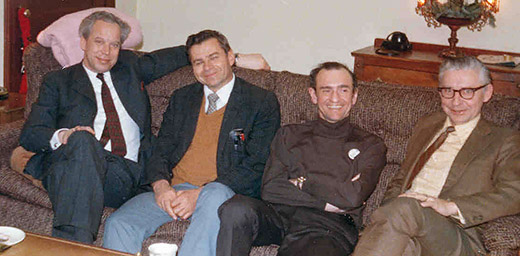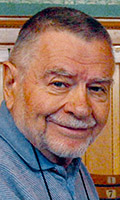In Honor of Robert Perske
Thank you to George Ducharme and Pat Beeman for hosting the Memorial Service on October 29, 2016 at the Darien Community Association in Darien, Connecticut.
The Minnesota Governor's Council on Developmental Disabilities honors Robert Perske with these archived items that demonstrate Bob's perseverance to Keep On Keeping On (KOKO). Together with a primary message from the Memorial Service to "Be Kind," this is the essence of Bob's life and his life's work.
George Ducharme began the Memorial Services with Bob's own words:
"I am not the smartest guy you'll ever meet, but I've found over the years I have a good heart. When I see somebody in agony, I have to get involved. I'm an individualist. I know I have to work for the general good of people but I always let myself get hooked on an individual person with an intellectual disability who is in trouble. Most of what I've learned come from such involvements."
"Here's a little secret about my writing. I do it because to me writing things out forces me to do my best thinking. Consequently, everything I've written that I'm proud of comes out of specific agonizing situations."
Here are examples of the agonizing experiences Bob encountered, that he felt compelled to write about, and that continued to keep him charged and motivated to pursue his life’s work. In his own words:
"Mealtimes for Persons with Severe Handicaps was a project that stemmed from the days when I worked in an institution where better than 10 per 100 people were dying from nutrition-related problems."
"New Life in the Neighborhood came out of a time when neighbors were marching on city hall, screaming and yelling about a group home coming into their neighborhood."
"Show Me No Mercy was written at a time that a newborn infant with Down Syndrome in Bloomington, Indiana was allowed to die in a hospital because the professionals said his 'life was not worth living.'"
"Circles of Friends was written because we were recognizing many of the people we love, work for and care about don’t have friends like the rest of us do."
"Unequal Justice tore me up. I’ve been following people with intellectual disabilities on the death rows in the US for whom 'confessions' came too easily with little direct evidence to back them up."

Bob was a giant in the field. Seated here (left to right) are Bengt Nirje, Robert Perske, Wolf Wolfensberger, and G. Allan Roehrer
In addition to his books,the Council has collected other materials from Bob’s career including the following.
Bob's early writings at the Greater Omaha Arc included a statement about the principle of normalization presented in "The Powerful Process of Normalization":
"We are learning that life in an institution is at best an artificial life. It is normal to live in the community as much as possible. And one never learns to live in the community by living at an institution a hundred miles way. One learns to live in a particular community by living in that community… on that block that has those houses, those people… his friends. He learns to find his way to that store, across that street… That's what the normalization principle has helped us to see"
The ENCOR section of Parallels in Time: Community Living
"The world in which we live is not always safe, secure, and predictable. It does not always say 'please' or 'excuse me' … This is the real world… [Persons with developmental disabilities] may, can, will, and should respond to risk with full human dignity and courage."
Bob assisted Dr. William Bronston in creating this Normalization slide show.
In 1978, the President's Committee published an influential report entitled A Leading Edge, authored by Bob Perske. This report described a wide range of successful programs across the country that shared a common goal of bringing individuals with developmental disabilities "out of a past of rejection and stigma – into a future of hope, understanding, and personal pride as productive individuals."

Robert Perske
In 1989, Bob wrote the conference proceedings for an early Self-Determination conference held in Washington DC. Thirty-nine recommendations were presented and explained in detail. Enabling people with disabilities to determine their own Futures was seen as the top priority in all government policymaking functions.
Learn more about Bob Perske at www.roberperke.com.




